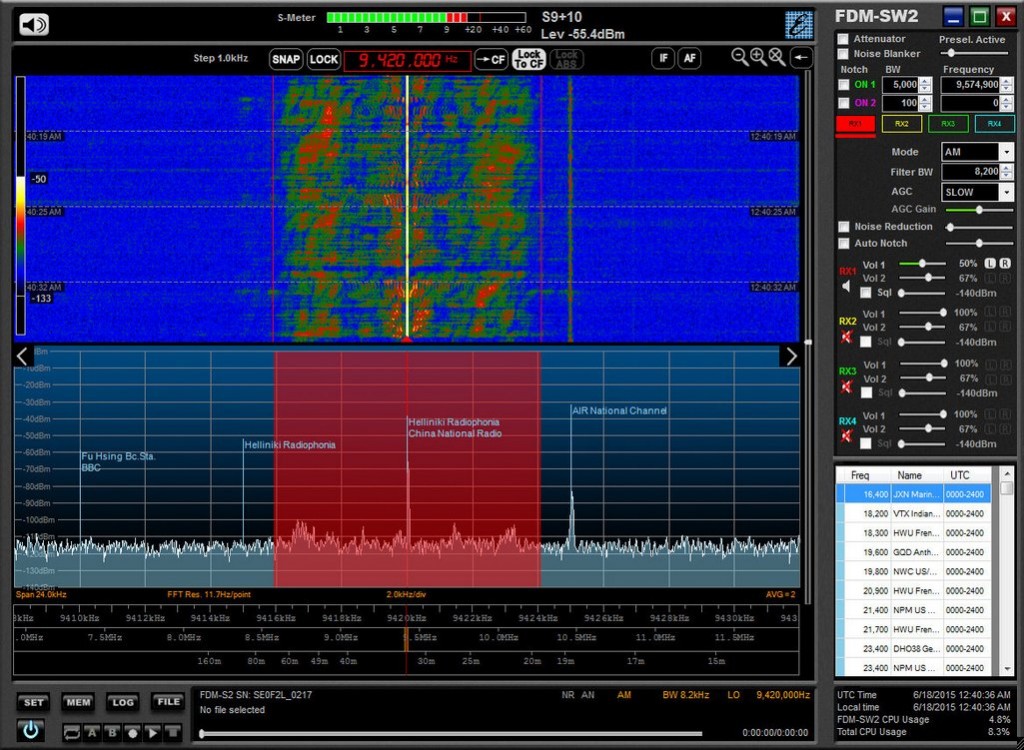 Early this morning, around 01:14 UTC, I tuned to 9,420 kHz with the Elad FDM-S2 and heard the Voice of Greece for the first time since the Greek national broadcaster, ERT had been restored.
Early this morning, around 01:14 UTC, I tuned to 9,420 kHz with the Elad FDM-S2 and heard the Voice of Greece for the first time since the Greek national broadcaster, ERT had been restored.
SWLing Post contributor, Richard Langley, also noted the strong signal from Greece. He has kindly shared the following information which he also posted in the DXLD Yahoo group:
“Greece is back on 9420 kHz this evening after being absent for some days and is now carrying the Voice of Greece […] program and not ERT from Athens or Thessaloniki. Noted with good signals in eastern Canada at 01:40 UTC. Radio audio is about half a minute delayed with respect to Internet stream: […](http://www.ert.gr/i-foni-tis-elladas/?). Not noted on other frequencies.
[…]9420 kHz signed off just after [02:00] UTC. Internet stream continued. And I should correct myself when I mentioned “not ERT from Athens or Thessaloniki.” Should have said not ERA from Athens or Thessaloniki. ERA is the abbreviation for Hellenic Radio […], as opposed to ERT which stands for Hellenic Radio-Television […]. ERT1, ERT2, etc. are TV stations while ERA1, ERA2, etc. are radio stations. This is a bit like BB1, BBC2, …, and BBC Radio 1, BBC Radio 2, and so on.”
Richard followed up a few hours later:
“I continued listening to the Internet stream after the SW transmission ended, and at 02:57 UTC, the station identified itself in both Greek (“Edo Athina, I Foni Tis Elladas”) and English (“This is Athens. You are listening to the Voice of Greece”) several times, followed by the traditional interval signal and then what I believe to be the Greek national anthem at 03:00 UTC. A program of Greek music then ensued.”
Many thanks for sharing the details, Richard. My recording actually ended when VOG signed off–I suppose I caught about the last 46 minutes of the broadcast.
Click here to download the recording as an MP3, or simply listen via the embedded player below:

Jeeeesh
Can’t I just enjoy the Greek music without any political rig a ma roll?
Its fun to pull it in on my little Chinese radios and feel the pull of another culture.
Retsina and Romance!
Thanks for the correction. That’s what I get for cutting and pasting. 😉 I’ll see if Thomas can amend my posting with the correct transliteration so that we don’t proliferate the incorrect wording.
— Richard Langley
Corrected! -Thomas
The correct is ” edo athina, I foni tis elladas ” (here Athens, the voice of Greece)
This is an example of how slowly the old, corrupt structures die in Greece.
For decades Greece spent much more money than it earned. The old broadcasting system is a typical example of how the governing parties created jobs for their followers – and after the next election the other party added theirs, too.
The real purpose of “Voice of greece” is to distribute money as described above. Or has anyone of you heard much more than Greece music and a station announcement now and then? Compare it to Radio Romania, from another poor county on the Balcans.
Remember: This station is “financed” by a state that has been bankrupt for years. I will be forced to pay my share of this dept personally in the near future – I hope in the very near future and not a lot more in a few more years.
Lots of corrupt structure in WB, IMF, Goldman Sachs, etc too. Lots of their demands will only make a few rich men richer and a lot of greek people much poorer.
At least they get their radio transmitted over Europe and over the world, unlike Germany which by next year will have their radio barely heard in Germany and certainly not outside it… And will the German taxpayers save any money from that? Certainly not.
This station, and the ERT as a whole, is not financed by the goverment, but by the TV licence (something like the german GEZ) which is paid with the electricity bill. Better change your source of information…
> This station, and the ERT as a whole, is not financed by the goverment,
> but by the TV licence (something like the german GEZ) which is paid
> with the electricity bill. Better change your source of information…
There is absolutely no need to change my opinion: The respective governments had enough influence to put their people there. The only difference is that this tax is gathered a different way.
What do you need to air a program like “Voice of Greece”?
– A SW transmitter, obviously. There are lots of possibilities to earn black money during erection and operation of such a thing. It could even be interesting to know who owned the land before. But that might prove difficult to evaluate in a country without a land registry.
– A few people to watch the transmitter.
– A PC with a MP3 player on random shuffle.
– A few 100 MP3 files, mostly with folklore music and a few station announcements.
– An Internet connection to insert a news broadcast from a national program from time to time.
A larger number of people creating and managing “international broadcasts”.
Did I forget anything?
BTW: OK, I think it is an big error to turn off all of our AM and SW transmitters. It gets much more difficult to hear German outside of the German-speaking countries. If a desaster should strike Germany we definitely will have enormous communication problems without any established long-range broadcasting means.
But we intensively consider how we can keep our money together. And after the German Reunification we shut down about all GDR broadcasting infrastructure to fight those communist insider relationships.